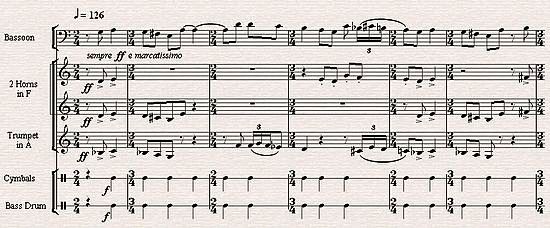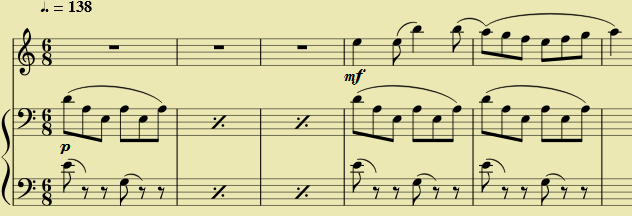
Charles Bobuck: Codgers on the Moon
The Residents
Cryptic, released 2012
Amazon.com
Spotify
The Residents' homage to Stravinsky buried under layers of illusion and misdirection
According to the official Residents hagiography, Charles Bobuck, or "Chuck" as he is referred to onstage by the Randy Rose character (AKA the "singing Resident" widely assumed to be portrayed by the real life Homer Flynn) is the purported name of the band's longstanding keyboard player and composer (widely assumed to be the real life Hardy Fox, 1945–2018). Starting with Chuck's unveiling in the Talking Light tour, The Residents released several instrumental albums and singles under the Charles Bobuck name, as a measure of differentiation from the band's eponymous releases, which mostly feature texted music. Most of these Bobuck contraptions are instrumental arrangements of previously-released Residents songs. But his Codgers on the Moon album consists of standalone electronic music compositions that have not had a previous life in the Residents canon.
If this identity obfuscation hasn't already confused you, know that The Residents published a Codgers on the Moon Web site that purports to be the liner notes for this album, but which is really a distinct, identically-named effort that combines Bobuck's ostensible autobiography with several short audio files. This multi-part tract seems to follow some outlines of what's known of Fox's "real" biography (including his Southern origins and a survey of electronic music equipment used by The Residents over the years), but it also furthers the Chuck story line as it has been delivered elsewhere, including the assertion that he "lives with his husband on a chicken farm outside San Francisco". The autobiography is divided into several pages that bear the name of one of the eleven tracks on the Codgers on the Moon CD. At one point there's a reference to the influence of gamelan music on the album, and at another point a musical excerpt from the Months are Like Moths track is provided. But otherwise, neither the text nor the music have anything in particular to do with the actual album. On the Web site's Addendum page, Bobuck explains: "People are asking why I didn't talk about the actual Codgers on the Moon music. I intentionally avoided describing it because I did not want to influence people's first listening experience." All righty then...
The album's music is typical of latter day Residents/Bobuck instrumental fare: multiple layers of synthesizer sounds of the more-or-less commercial variety, sometimes with drum machine riffs added, and in this particular case with an extra dose of kulintang influence. (I should point out that gamelan ensembles have long been an important part of the music scene in the Bay Area where The Residents are based, though Bobuck's autobiography claims that he first heard this music as a child while living in the southern Philippines.) What distinguishes this album from dozens of other recent Residents efforts, though, is an infatuation with Stravinsky, to the point where what you're hearing is often an elaborate remix of a particular Stravinsky composition. There're plenty of Residents precedent for this approach: the American Composer Series, the covers of James Brown and Hank Williams tracks, the appropriation of William Russell's Rhumba for percussion in the Explosion track from the 1972 Santa Dog double 7-inch LP, and so on. But for whatever reason, the Stravinsky connection is not mentioned anywhere in the elaborate notes, Web pages and other published materials that pertain to Codgers on the Moon.
The Stravinsky originals are much more deeply obscured than their counterparts in a piece like Pollex Christi, which is otherwise the closest antecedent for Codgers in the Residents oeuvre. Bobuck's basic technique is to follow the bar-by-bar progression of the original, while changing all the notes and inventing his own digital instrumentation. Imagine realizing a Stravinsky piece using synthesizers (Switched-On Bach style), or performing it on some strange chromatic gamelan instruments tuned to equal temperament. Next send the result through a ring modulator and a low pass filter, leaving everything but the original rhythm and form transformed beyond recognition. That's pretty much how the sound world of Codgers on the Moon works.
Banana Fanna, for example, is the opening March from Stravinsky's Renard:
Months are like Moths is a Napolitana that Stravinsky wrote for two pianos then included in the Suite No. 1 for small orchestra:
Sinking Solo retells the Russian Dance from the first act of Petrushka:
while Spiders and Hitting Things are based on the first and third movements of the Symphony of Psalms respectively. These are easy to follow once you recognize their source, but the origins of The Voice of a Man with Nothing to Say in Act One of Petrushka are more concealed. Bobuck's passage at 2:31 corresponds to the one starting at rehearsal number 6 of Stravinsky's 1911 version:
after which Bobuck follows along measure for measure until rehearsal number 20, where he breaks off and skips ahead to the flute cadenza at rehearsal number 31:
ending before the Russian Dance referenced in Sinking Solo.
There's more to be found. And if you dig the Residents, or if you enjoyed catching Zappa's quote from The Rite of Spring in the backing vocals of Fountain of Love, then you'll probably be delighted with this effort, even if it's something of a footnote in both musical history and Residents history. The boys from Frisco reached their artistic and popular peak with Freak Show, and some have dismissed their recent work as the throes of a project in its declining years. But their dedication and productivity haven't flagged, and as long as I haven't grown tired of listening to them, then I'll be glad to have them still around.
- Michael Schell
First published November 2014, updated November 2018
![]()
Selected writings |
Schellsburg home
Jerry Hunt |
cribbage
![]()
Original Material and HTML Coding Copyright © 2014–21 by
Michael Schell. All Rights Reserved.




